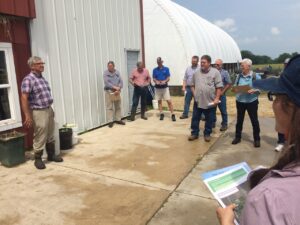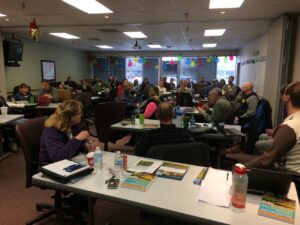2016 Annual Report for ENC13-140
The Conservation Biological Control Short Course
Summary
Native insects that attack crop pests are an overlooked resource in agricultural systems. Although vast numbers of such beneficial insects are at work on farms across the world, they are eclipsed in farm education by a comparatively smaller diversity of pest species. Yet, as a large body of research now demonstrates, farmers as diverse as Christmas tree growers in Illinois to blueberry growers in Michigan benefit from natural pest control.
The Conservation Biological Control Short Course synthesizes that body of research and offers realistic solutions for enhancing beneficial insect populations on farms. Specific course topics include beneficial insect biology, designing habitat enhancements, pesticide risk mitigation, securing financial support through USDA programs, and real-world case studies.
This project, the outgrowth of a six-year research initiative conducted by the Xerces Society and university research partners, for the first time ever presents conservation biological control as an easy-to-adopt framework for multiple crop systems.
The project is being promoted through multiple channels, as well as in partnership with relevant agencies and State SARE Coordinators. Qualitative and quantitative post-course feedback from participants will be incorporated on an ongoing basis.
Based upon the overwhelmingly successful results of a prior PDP project using this same model (related to pollinator conservation), we are confident this project will foster widespread adoption of course concepts across the region.
At this time, we have experienced no major obstacles to the successful completion of our project. We are excited to be bringing this course content to our audience of IPM specialists, Extension personnel, NRCS conservation planners, Soil and Water Conservation District technicians, state departments of agriculture, crop consultants, and sustainable agriculture organizations. We continue to be grateful for North Central SARE’s support of this important training opportunity.
Objectives/Performance Targets
During this three-year project, we will deliver 12 Conservation Biological Control Short Courses in all North Central SARE states, providing training for more than 350 participants including farmer educators, conservation agency staff, crop consultants, farm professionals, and other stakeholders. Participants will receive in-depth training in the latest science-based strategies of ecological pest control. Individual workshop goals include:
- At least 30 participants per course
- Conservation practices adopted on at least 1,000 acres per course
- New enrollments in USDA conservation programs resulting from each course
Accomplishments/Milestones
During the reporting period, we conducted three short courses that were attended by a total of 105 participants. The primary audiences at all of these events were staff from the NRCS, Soil and Water Conservation Districts, Extension, and sustainable agricultural organizations as well as a number of individual farmers, researchers, crop consultants, master gardeners, naturalists, and non-governmental conservation organization staff. Currently, planning is underway for additional short courses in Kansas, Missouri, Nebraska, North Dakota, Ohio, and South Dakota for the spring and summer of 2017.
Whenever possible, short courses featured guest speakers from partnering agencies, organizations, or universities. These guest speakers add to the comprehensive content that the Xerces Society has developed for the course. Since many of these speakers regularly work in the field and provide guidance to landowners on conducting conservation biological control related research, they are able to share practical information with course participants that helps them envision how conservation practices that support beneficial insects will work on their farms.
During the reporting period we delivered Conservation Biological Control Short Courses in Illinois, Indiana, and Michigan. Specific accomplishments for each course are described below.
ILLINOIS
 Short course attendees toured the Prairie Fruits Farm and Creamery and conducted a beneficial insect habitat assessment. Photograph by Thelma Heidel-Baker, The Xerces Society.
Short course attendees toured the Prairie Fruits Farm and Creamery and conducted a beneficial insect habitat assessment. Photograph by Thelma Heidel-Baker, The Xerces Society.
The Illinois short course was held on June 25, 2016, in Urbana, Illinois. We worked closely with The Land Connection, a local non-profit organization, to bring this course to central Illinois. The Land Connection staff helped connect us to local venue options as well as potential local farms to host the course’s field activities. We partnered with the University of Illinois Urbana-Champaign to promote and host the classroom portion of the course. We had 40 participants at this course, including seven USDA NRCS staff. Shannon Allen, Initiatives Coordinator for Illinois NRCS, provided a guest speaker presentation on NRCS cost sharing programs in Illinois. Highlights for this event included field activities at Prairie Fruits Farm & Creamery in Urbana. Participants received a tour of the farm and then utilized the Xerces Society’s Beneficial Insect Habitat Assessment Guide tool to assess the farm for beneficial insects. The course wrapped up with insect identification activities.
INDIANA
 47 participants, many of whom were NRCS staff, attended the Indiana Conservation Biological Control Short Course in December 2016. Photograph by Thelma Heidel-Baker, The Xerces Society.
47 participants, many of whom were NRCS staff, attended the Indiana Conservation Biological Control Short Course in December 2016. Photograph by Thelma Heidel-Baker, The Xerces Society.
The Indiana short course was held on December 16, 2016, at the NRCS State Office in Indianapolis, Indiana. We had 47 participants at this course, including 37 agricultural support staff (primarily NRCS staff). We partnered closely with Indiana NRCS to coordinate this event, and they provided the venue for the course as well as valuable support and promotion, as evidenced by the number of NRCS staff in attendance. Highlights for this event included guest speaker presentations by Shannon Zezula, Indiana State Resource Conservationist, USDA NRCS, and Dr. Ian Kaplan, Department of Entomology, Purdue University. Dr. Kaplan provided an overview of his ongoing conservation biocontrol research in Indiana.
MICHIGAN
We held the Michigan short course on July 25, 2016, at Michigan State University’s Kellogg Biological Station in Hickory Corners, Michigan. We partnered closely with Kellogg Biological Station to coordinate this event, and both the classroom and field activities were held on station grounds. We had 18 participants including 10 agricultural support staff (USDA NRCS or soil and water conservation district staff). Event highlights included an in-depth habitat assessment training as well as beneficial insect field identification activities at Kellogg Biological Station’s Bird Sanctuary. The classroom training was enhanced by guest presentations made by Daniel Zay, State Biologist for USDA NRCS, and conservation biocontrol researcher Dr. Rufus Isaacs, Professor, Department of Entomology, Michigan State University. Dr. Isaacs, a long-time partner scientist with the Xerces Society, provided an overview of his conservation biocontrol research in Michigan crops.
Impacts and Contributions/Outcomes
Through this project, we are impacting the way that agricultural support staff and farmers incorporate conservation biological control practices into their work. Conservation Biological Control Short Course participants are gaining a comprehensive understanding of beneficial insect ecology, the design and installation of habitat features that support those insects, and concepts for balancing the needs of beneficial insects with farm practices.
Of the 2016 short course attendees, 54% (57 of 105) completed the day-of-course evaluations. Evaluation forms were completed at the Indiana and Michigan short courses, but were not distributed at the Illinois short course. Of the 57 evaluation respondents, 91% (52 of 57) reported increased knowledge in how to reduce risks to beneficial insects from pest management practices, and 91% of participants (52 of 57) reported increased knowledge on evaluating a site for its ability to support beneficial insects.
Of the 47 agricultural support staff who responded to the day-of-course evaluation, 96% (45 of 47) said that they plan to use course information to advise farmers about farm management practices that support beneficial insects. Among those reporting, 87% (41 of 47) said they would incorporate beneficial insect habitat enhancement into existing trainings on federal conservation programs and 77% (36 of 47) said they would encourage farmers to enroll in NRCS conservation programs for beneficial insects. In total, these agricultural support staff estimated that they interact with 4,355 farmers annually.
While the short course specifically targets agricultural support staff, a number of farmers attended each event. Among these farmers, 86% (6 of 7) said that attending the short course changed how they would support beneficial insects on their farms. We found that 86% (6 of 7) of these farmers intend to adjust farm management practices (tillage, mowing, etc.) on their farms to support and increase beneficial insect populations. These farmers reported to collectively manage 1,571 acres of land.
Feedback from short course participants to date has been very positive. Examples of specific comments from this reporting period include:
“Excellent presenter! Thank you Xerces for all your work!!” – Ag support staff participant, Indiana Short Course, 2016
“Well done! Thanks for all the info.” – Indiana NRCS participant, Indiana Short Course, 2016
When asked what was the most important part of this course, participants responded with:
“Learning the types of habitat that can be implemented” – Extension entomology participant, Indiana Short Course, 2016
“Learning how to evaluate habitat and networking with NRCS” – NRCS staff, Michigan Short Course, 2016
In late 2016, we distributed a one-year post course follow up survey to gauge how past participants are using the information gained from the short course. We surveyed 65 people who attended one of three North Central SARE Conservation Biocontrol Short Courses held in 2015 (in Wisconsin and Iowa) and received six responses, for a 9% response rate as of February 22, 2017. Based on other similar surveys for SARE PDP projects, we had anticipated a higher response rate and will investigate why we had less response compared to past surveys. Prior to the next reporting period, we will develop and implement a plan to improve participation in future follow-up surveys.
The survey respondents have gone on to use the course information in a variety of ways. Of the six respondents, one person self-identified as agricultural support staff and selected the following standardized categories as ways that he/she has used course information: assisted farmers, clients, or land managers in implementing beneficial insect conservation practices; advised on incorporating beneficial insect conservation measures into how farms or land is managed; made specific recommendations on farm management practices for beneficial insect conservation; and encouraged or assisted with enrollment in NRCS conservation programs for beneficial insects. The five farmers, land managers, and other participants who responded to the survey indicated that they had used short course information in the following ways: incorporated beneficial insect conservation measures into how their farm or land is managed (80%); considered pesticide impacts on beneficial insects in pest management decisions (60%); and provided additional habitat resources for beneficial insects, such as wildflower plants, flowering cover crops, etc. (60%).
The survey respondents also reported on the direct actions that they have taken as a result of course attendance. The agricultural support staff member reported that eight of the farms he/she works with enrolled in NRCS conservation programs for beneficial insects. He/she also reported he/she advised in the creation of 200 acres of habitat (insectary strips, hedgerows, etc.) for beneficial insects and helped change farm management practices to protect beneficial insects on 250 acres. The farmers and landowners who responded reported to have created 6.5 acres of beneficial insect habitat, and grow a variety of crops including apples, pasture, and timber.
Collaborators:
Pollinator Program Director
Xerces Society
628 NE Broadway, Suite 200
Portland, OR 97232
Office Phone: 5032326639
Conservation Biologist
Xerces Society
628 NE Broadway, Suite 200
Portland, OR 97232
Office Phone: 5032326639
Senior Pollinator Conservation Specialist
Xerces Society
628 NE Broadway, Suite 200
Portland, OR 97232
Office Phone: 5032326639